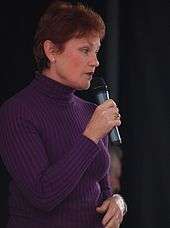Hansonism
In Australian politics, Hansonism is the political ideology of the leader of One Nation Pauline Hanson and those that follow her. The term has been used since 1998,[1] and was added to the The Australian National Dictionary in 2018.[2]
| ||
|---|---|---|
Elections as Leader |
||
Ideology
Hansonism has been described as a form of right-wing populism. A common theme within Hansonism is the idea that "multiculturalist elite" are manipulating "hardworking Australians" into supporting certain policies, such as Indigenous land rights.[3] Hansonism believes that rights for minority groups, such as for Indigenous Australians, are forms of reverse racism and are anti-equality.[3]
A key feature of Hansonism is the support of economic nationalism and the opposition to economic rationalism.[4] Hanson has supported the re-introduction of tariffs, establishing government-run bank, renewing local manufacturing, and is critical multinational corporations.[4]
In 1998, Kukathas and Maley identified two strands of Hansonism: Soft Hansonism, and Hard Hansonism.[1] Hard Hansonism refers to the policies directly supported by Hanson, such as anti-Asian sentiment, an attachment to the White Australia Policy, criticism of multiculturalism, and the populism view that these policies are associated with "the people".[1] Soft Hansonism is associated with Hansonist policies that take a milder form or are promoted by non-One Nation members, such as opposition to asylum seekers or the views of Graeme Campbell.[1]
Critical reception
Academic Tod Moore interprets Hansonism as a reaction against the rise of neoliberalism and globalism, inspired by both fear and anger, and that it has been adopted by blue-collar and middle class Australians due to the acceptance of neoliberalism by the Australian Labor Party. However, Moore critiqued Hansonism as contradictory as the policies would ultimately lead to policies he believes as harmful to those groups, such as "smaller government, fewer public amenities, more financial deregulation, weaker unions, and greater wealth inequality".[4]
Milton Osborne, in 1999, noted that research found that Hanson's initial supporters did not find Asian immigration a major reason for their support, but instead they were most concerned about economic deregulation and unemployment. Osborne also argues that her support of substantial tax cuts undermined support for Hansonism, leading to her initially leaving parliament.[5]
References
- Kukathas, Chandran; Maley, William (1998). "The Last Refuge Hard and Soft Hansonism in Contemporary Australian Politics" (PDF). CIS Issue Analysis (4). Retrieved 12 June 2020.
- Astle, David (29 August 2016). "The Australian National Dictionary updated after 28 years". The Sydney Morning Herald. Retrieved 1 June 2020.
- Fleming, Andy; Mondon, Aurelien (2018-02-05). Rydgren, Jens (ed.). The Radical Right in Australia. 1. Oxford University Press. doi:10.1093/oxfordhb/9780190274559.013.32.
- Mooreq, Tod (2019). "Once as Tragedy and Again as Farce: Hansonism, Backlashers, and Economic Nationalism After 20 Years". In Grant, Bligh; Moore, Tod; Lynch, Tony (eds.). The rise of right-populism: Pauline Hanson's One nation and Australian politics. Springer. ISBN 978-981-13-2669-1.
- Osborne, Milton (1999). "AUSTRALIA'S ELECTION YEAR: Hansonism and the Asian Financial Crisis". Southeast Asian Affairs: 52–64.
